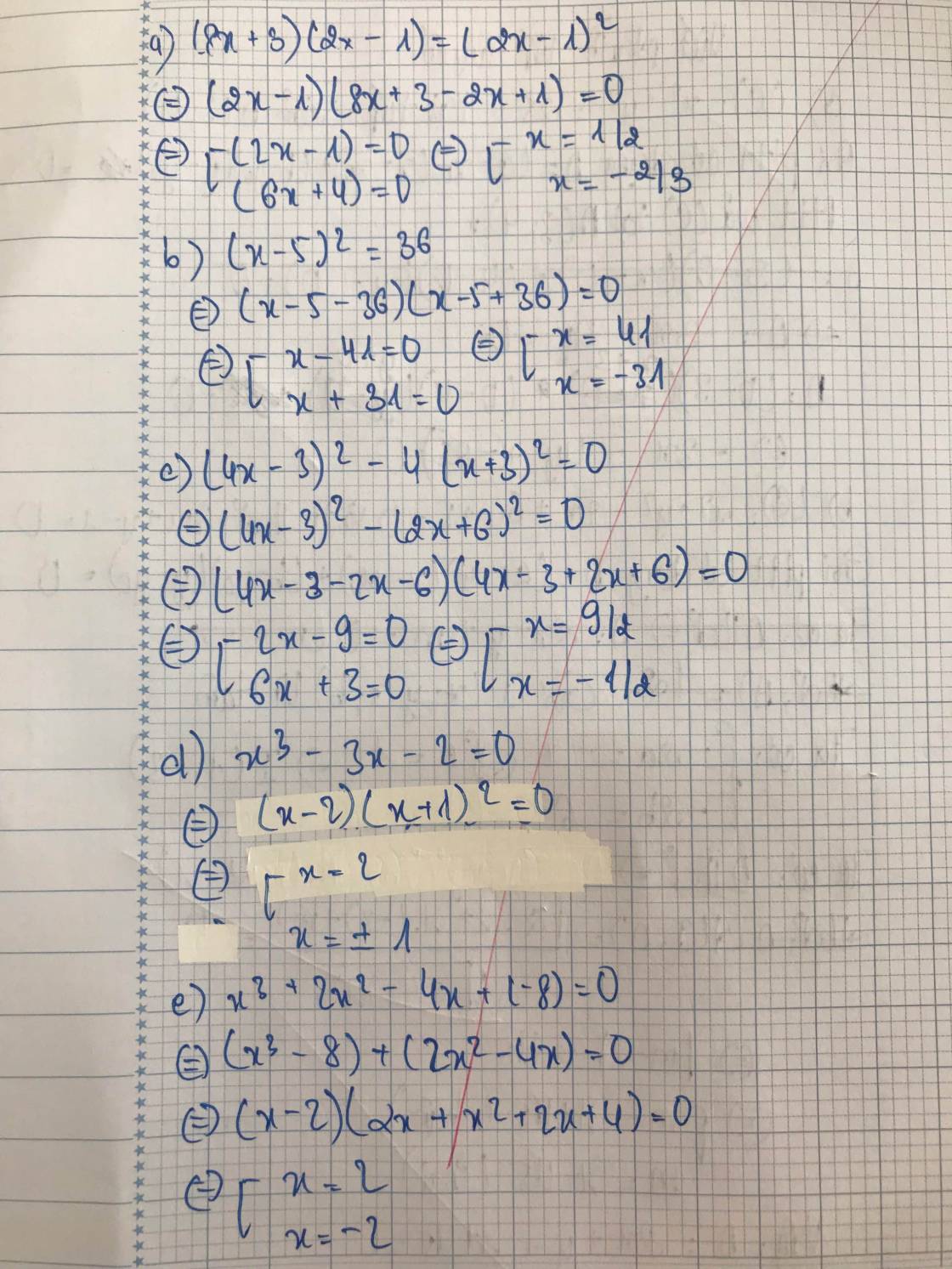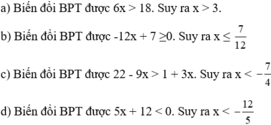
Hãy nhập câu hỏi của bạn vào đây, nếu là tài khoản VIP, bạn sẽ được ưu tiên trả lời.


b) 5x(x-2000)-x+2000=0
\(\Rightarrow5x\left(x-2000\right)-\left(x-2000\right)=0\\ \Rightarrow\left(x-2000\right)\left(5x-1\right)=0\)
\(\Rightarrow\left\{{}\begin{matrix}x-2000=0\\5x-1=0\end{matrix}\right.\Leftrightarrow\left\{{}\begin{matrix}x=0+2000\\5x=0+1\end{matrix}\right.\Leftrightarrow\left\{{}\begin{matrix}x=2000\\5x=1\end{matrix}\right.\Leftrightarrow\left\{{}\begin{matrix}x=2000\\x=\dfrac{1}{5}\end{matrix}\right.\)

\(a)PT\Leftrightarrow4x^2-9-4x^2+20x+3x=0.\\ \Leftrightarrow23x=9.\\ \Leftrightarrow x=\dfrac{9}{23}.\\ b)PT\Leftrightarrow\left(2x+1\right)\left(4x-3\right)-\left(2x+1\right)\left(2x-1\right)=0.\\\Leftrightarrow\left(2x+1\right)\left(4x-3-2x+1\right)=0.\\ \Leftrightarrow\left(2x+1\right)\left(2x-2\right)=0.\\ \Leftrightarrow\left(2x+1\right)\left(x-1\right)=0. \)
\(\Leftrightarrow\left[{}\begin{matrix}x=\dfrac{-1}{2}.\\x=1.\end{matrix}\right.\)

i,<=>(2x - 1)(2x - 1 + 2 - x) = 0 <=> (2x - 1)(x + 1) = 0
<=> x = 1/2 hoặc x = -1
j,<=>(x - 1)(5x + 3) - (3x - 5)(x - 1) = 0
<=>(x - 1)(2x + 8) = 0 <=> x = 1 hoặc x = -4
k,<=>4(x + 5)(x - 6) = 0 <=> (x + 5)(x - 6) = 0
<=> x = -5 hoặc x = 6
m,<=>x^2(x + 1) + x + 1 = 0
<=>(x^2 + 1)(x + 1) = 0 (1)
Mà x^2 + 1 > 0 với mọi x nên (1) xảy ra <=> x + 1 = 0
<=> x = -1

a: \(\Leftrightarrow2x\left(x^2+2x+5\right)=0\)
=>x=0
b: \(\Leftrightarrow\dfrac{x}{x-1}-\dfrac{x+1}{x-3}=\dfrac{1}{2}\)
\(\Leftrightarrow x^2-4x+3=2x\left(x-3\right)-2\left(x^2-1\right)\)
\(\Leftrightarrow x^2-4x+3=2x^2-6x-2x^2+2=-6x+2\)
\(\Leftrightarrow x^2+2x+1=0\)
=>x=-1(nhận)
\(a,2x^3+4x^2+10x=0\\ \Leftrightarrow2x\left(x^2+2x+5\right)=0\\ \Leftrightarrow\left[{}\begin{matrix}2x=0\\x^2+2x+5=0\end{matrix}\right.\\ \Leftrightarrow\left[{}\begin{matrix}x=0\\\left(x^2+2x+1\right)+4=0\end{matrix}\right.\\ \Leftrightarrow\left[{}\begin{matrix}x=0\\\left(x+1\right)^2+4=0\left(vô..lí\right)\end{matrix}\right.\)
\(b,ĐKXĐ:\left\{{}\begin{matrix}x\ne1\\x\ne3\\x\ne4\end{matrix}\right.\\ \dfrac{x^2-4x}{x^2-5x+4}-\dfrac{1}{2}=\dfrac{x+1}{x-3}\\ \Leftrightarrow\dfrac{x\left(x-4\right)}{\left(x-1\right)\left(x-4\right)}-\dfrac{1}{2}=\dfrac{x+1}{x-3}\\ \Leftrightarrow\dfrac{x}{x-1}-\dfrac{1}{2}-\dfrac{x+1}{x-3}=0\\ \Leftrightarrow\dfrac{2x\left(x-3\right)}{2\left(x-1\right)\left(x-3\right)}-\dfrac{\left(x-1\right)\left(x-3\right)}{2\left(x-1\right)\left(x-3\right)}-\dfrac{2\left(x+1\right)\left(x-1\right)}{2\left(x-1\right)\left(x-3\right)}=0\)
\(\Leftrightarrow\dfrac{2x^2-6x}{2\left(x-1\right)\left(x-3\right)}-\dfrac{x^2-4x+3}{2\left(x-1\right)\left(x-3\right)}-\dfrac{2x^2-2}{\left(x-1\right)\left(x-3\right)}=0\)
\(\Leftrightarrow\dfrac{2x^2-6x-x^2+4x-3-2x^2+2}{2\left(x-1\right)\left(x-3\right)}=0\)
\(\Rightarrow-x^2-2x-1=0\)
\(\Leftrightarrow x^2+2x+1=0\\ \Leftrightarrow\left(x+1\right)^2=0\\ \Leftrightarrow x+1=0\\ \Leftrightarrow x=-1\left(tm\right)\)

Bài 2:
\(A=\dfrac{2}{-x^2-2x-2}=\dfrac{-2\left(-x^2-2x-2\right)-2x^2-4x-2}{-x^2-2x-2}\) \(=-2+\dfrac{2\left(x+1\right)^2}{-x^2-2x-2}\ge-2\)
Dấu bằng xảy ra \(\Leftrightarrow x+1=0\Leftrightarrow x=-1\)
Vậy \(A_{Min}=-2\) khi \(x=-1\)
Bài 1:
a) Ta có: \(2x^2-6=0\)
\(\Leftrightarrow2x^2=6\)
\(\Leftrightarrow x^2=3\)
hay \(x\in\left\{\sqrt{3};-\sqrt{3}\right\}\)
Vậy: \(S=\left\{\sqrt{3};-\sqrt{3}\right\}\)


a, ( 8x + 5 )( 4x + 3 )( 2x + 1 ) = 9
<=> ( 8x + 5 )[ 2( 4x+3)] [ 4 ( 2x+1 )] = 9* 2 * 4
<=> (8x+5)(8x+6)(8x+4) = 72
Đặt 8x+5 = y ta có phương trình tương đương :
y ( y -1 ) ( y+1) = 72
......................
b, Tương tự phần a nhé
c, x^3 + 5x^2 + 5x + 2=0
<=> x^3 + 1 + 5x^2 + 5x + 1 = 0
<=> (x+1)(x^2 - x +1) + 5x ( x+1 ) + 1 =0
<=> (x+1 ) ( x^2+4x + 1) + 1 = 0